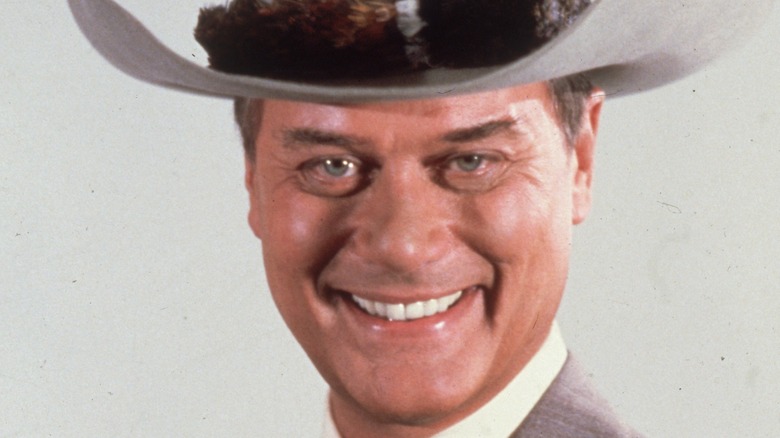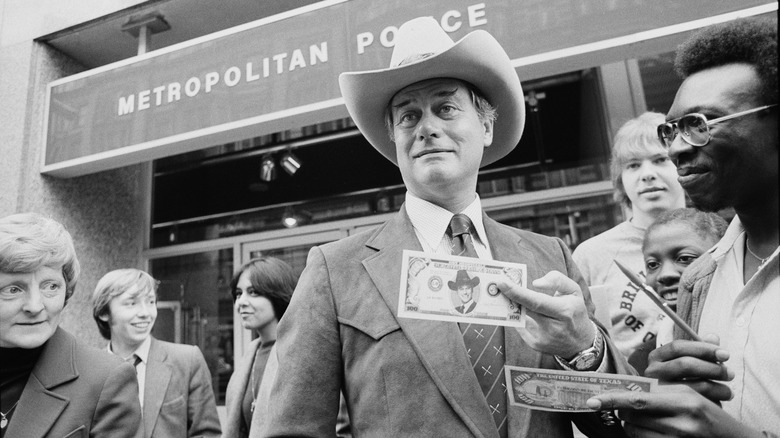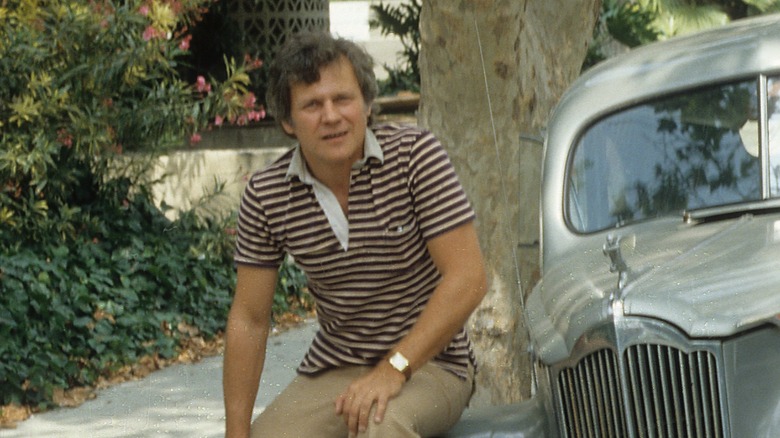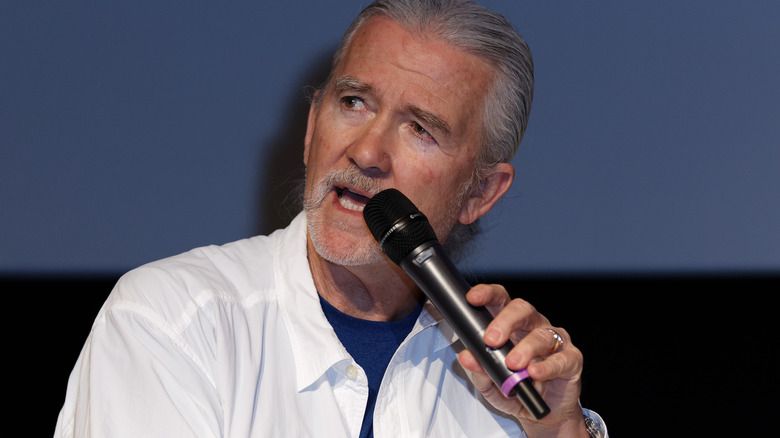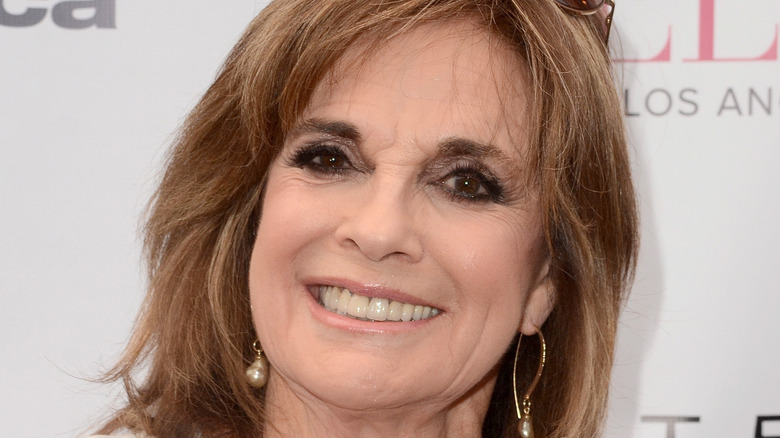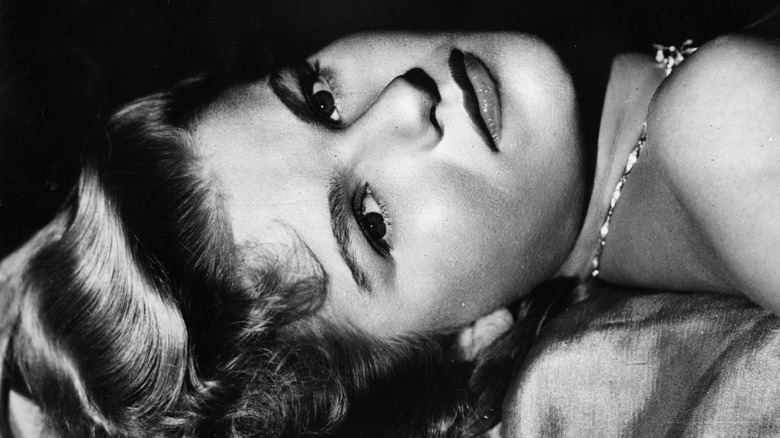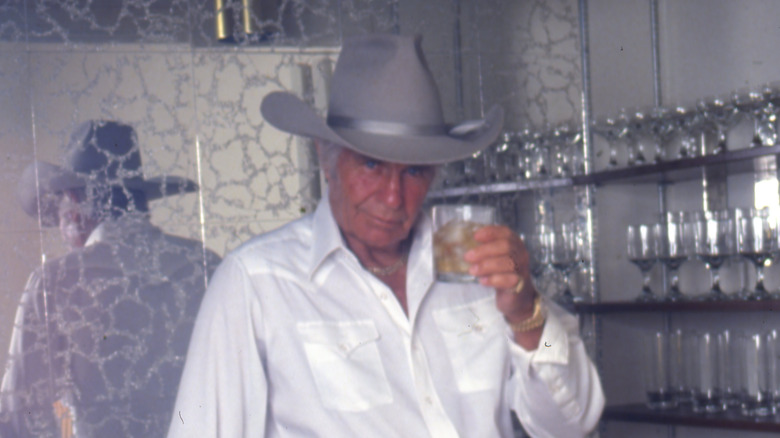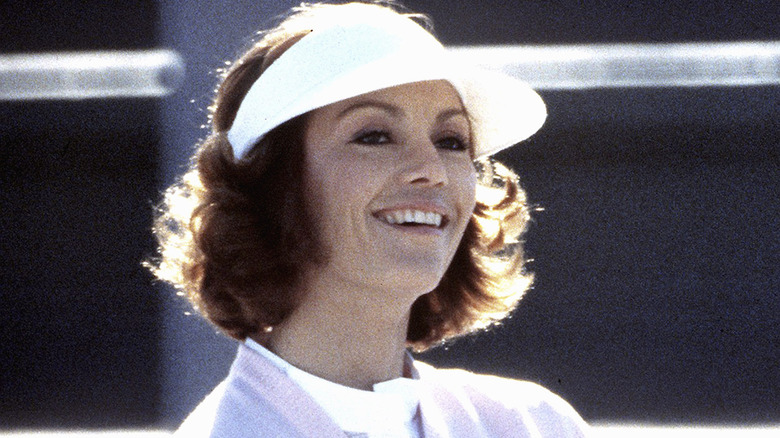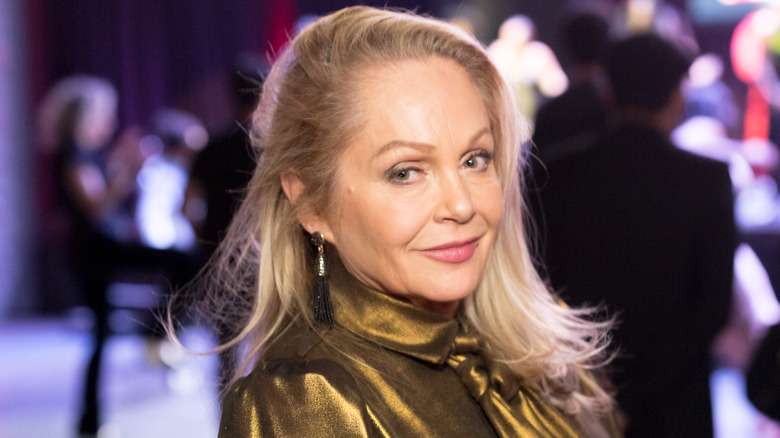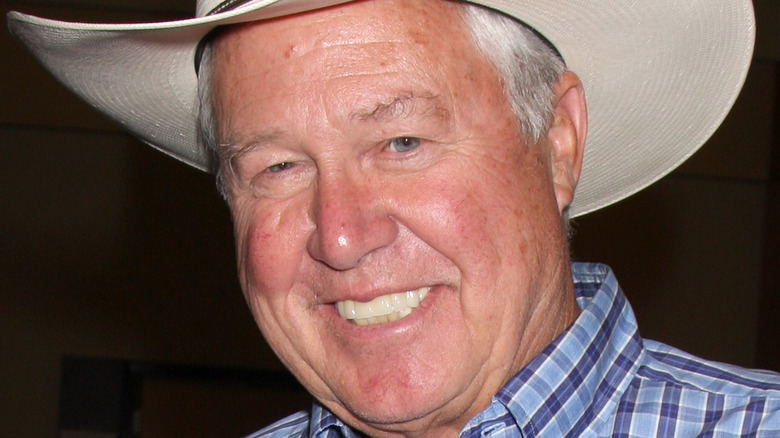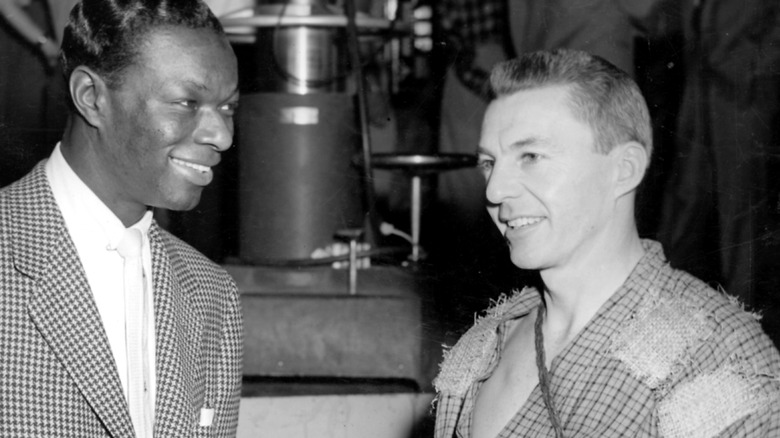Dallas: Whatever Happened To The Original Cast?
Serialized drama, cliffhanger endings, morally compromised protagonists, and internationally shocking plot turns: all common elements in what's often called the golden age of television. But decades before Tony Soprano and Walter White, such dark and headline-grabbing plotting was popularized by the prime-time CBS drama, "Dallas." Very much a product of the 1980s, and the conventions of the soap opera genre, "Dallas" paved the way for later TV antiheroes in its depiction of cutthroat oil tycoon J.R. Ewing (Larry Hagman), who struck out at professional rivals and his own family week after week.
Initially conceived by creator David Jacobs as a miniseries about a Californian family on a cul-de-sac that could star Linda Evans, "Dallas" gradually evolved under showrunner Leonard Katzman (per Texas Monthly). An initial focus on a Romeo and Juliet-style romance gave way to J.R.'s scheming, and the lack of resemblance to the real Dallas, Texas was ignored. By the end of the third season, which ended with J.R. shot and his assailant unknown, "Dallas" blew up into a mega-hit beyond anyone's expectations.
Hagman remained with the series from its beginning in 1978 to its finale in 1991, and was the only actor to appear in every episode of the original "Dallas." But many of his co-stars from the show's first season remained with it for years, some to the very end. That starting cast went on to a range of fates in their lives and careers when their time at Southfork Ranch ended.
Larry Hagman
In his long acting career, Larry Hagman became closely identified with two roles: Major Anthony Nelson on "I Dream of Jeannie," and J.R. Ewing on "Dallas." The former show was one he long shied away from. During filming, he clashed with the writers, went through a nervous breakdown, and tried to quit. But he delighted in his role on "Dallas," where he was the undisputed star. "I don't understand why people love J.R. so much," he told USA Today, but he said that playing such a cad was fun to do and gave him an outlet for darker impulses that might have jeopardized his marriage to Maj Axelsson.
But the part didn't exorcise Hagman's indulgence of drugs and alcohol. Before, during, and after "Dallas," he drank heavily, at one point reaching five bottles of champagne a day. The habit caught up with him not long after "Dallas" ended in 1991. The year after, he was diagnosed with cirrhosis, and in 1995, cancer demanded that he get a liver transplant. Even then, he didn't give up drinking altogether. Hagman was also open about his experiments with LSD, which he said took away his fear of death (via MAPS).
The eccentric Hagman long depended on Axelsson to help advise him, but she was diagnosed with Alzheimer's in 2008 and deteriorated beyond his ability to care for her alone. While filming the 2012 "Dallas" revival, Hagman himself was diagnosed with throat cancer. He died in 2012 at age 81.
Ken Kercheval
The archnemesis of J.R. Ewing's throughout "Dallas's" many years was his brother-in-law and fellow oilman, Cliff Barnes, played by Ken Kercheval. Kercheval was the only actor besides Hagman to be with "Dallas" from the first season to the fourteenth, though his early years with the series saw him billed as a recurring rather than star player. Made famous by playing a pair of bitter enemies, the two actors got on well in real life. They were also connected professionally by the series "I Dream of Jeannie." When NBC produced the TV spin-off film "I Still Dream of Jeannie," Hagman did not return to play Major Anthony Nelson. Instead, Kercheval played Jeannie's temporary master while she tried to work around an evil scheme of her sister's (per Barbara Eden's "Jeannie out of the Bottle").
On the set of "Dallas," Hagman urged Kercheval, among others, to give up smoking. Two years after the show ended, Kercheval — who smoked up to three packs of cigarettes a day while on the series — was diagnosed with lung cancer. The two tumors growing on his left lung were caught early, and after an operation that took out part of his lung in 1994, he made a full recovery.
In his later years, Kercheval did some stage work in Britain, and reunited with Hagman for the 2012 "Dallas" revival. In 2019, he fell into ill health, and died of probable complications of pneumonia at the age of 83.
Patrick Duffy
For most of "Dallas's" run, Patrick Duffy was on hand to play younger son Bobby Ewing. The character's death midway through the series led to one of the most infamous retcons in TV history. After Bobby was revived, Duffy stayed with the show until its end in 1991. At that point, he felt ready to jump from drama — convoluted and preposterous though it might be at times — to a full-blown comedy.
His chance came when Tim Miller, a friend of "Dallas" showrunner Leonard Katzman, cast Duffy as the father in the sitcom "Step By Step." The actor told Entertainment Tonight that it was the best role of his career. He and co-star Suzanne Somers became good friends, and the show ran for seven seasons. And television was kind to Duffy a third time in 2006, when he picked up a recurring role as Stephen Logan on the soap opera "The Bold and the Beautiful." When the "Dallas" revival was set to begin, with Duffy attached to it, Logan was written out of the series with the explanation that the character was moving to Dallas. But Duffy reprised the role eleven years later.
Duffy's personal life suffered a blow after "Dallas" ended; his wife of almost 50 years, Carlyn Rosser, was diagnosed with cancer and died in 2017. But in 2020, he and "Happy Days" alum Linda Purl connected during the COVID-19 pandemic and have been in a relationship since (per People). And Duffy, 74, still continues to act.
Linda Gray
During the first season of "Dallas," the part of Sue Ellen Ewing, J.R.'s wife, was so underdeveloped that the crew took to calling actress Linda Gray "the brunette on the couch" (per Texas Monthly). But during her downtime, Gray fleshed out the part in her own mind, and her impromptu arguments with Larry Hagman caught the writers' ear. The antagonism between husband and wife was built up over the years, and away from the camera, Gray socialized with Hagman and his wife. She stayed with "Dallas" for most of its run, though she did get frustrated with the essentially reactionary nature of her part, and all the female parts on the series, by the end. Her request to direct an episode was rejected by showrunner Leonard Katzman, lest it set a precedent for other women taking the director's chair.
Since the end of "Dallas," Gray has continued to work as an actress, and not just for the screen. Her stage career has brought her a variety of roles beyond Sue Ellen. She played the Fairy Godmother in a pantomime version of "Cinderella," and in 2016, she took over the part of Mrs. Robinson in the West End production of "The Graduate." The run wasn't her only connection with that film; she claimed to Anderson Cooper that it's her stockinged leg on "The Graduate's" notorious poster (via The Hollywood Reporter). Besides acting, Gray has also worked as a goodwill ambassador for the United Nations.
Barbara Bel Geddes
"They're always asking me to play well-bred ladies," Barbara Bel Geddes said of her acting career (via People). "I'm not very well-bred and I'm not much of a lady." Her role as Ewing family matriarch Miss Ellie asked for precisely that. But the part of Maggie in "Cat on a Hot Tin Roof," which she originated in 1955, gave her an early chance to stretch her acting skills. The stage was where Bel Geddes got her start as an actress, and it's where she returned after a brief time in Hollywood under contract to RKO. But acting of any kind was put on hold when Bel Geddes' husband, Windsor Lewis, was diagnosed with cancer. He passed away in 1972, and Bel Geddes took the part of Miss Ellie primarily to escape the financial hole Lewis's medical expenses put her in.
"When I'm not acting, I like to get as far away from it as I possibly can," Bel Geddes told People in 1982. Her home was in Maine, where she supported her daughter's nonprofit Lifeline for Wildlife, Inc. It was an organization created to rescue and rehabilitate animals in New York state for release back into the wild. After her 13th season with "Dallas," Bel Geddes retired to write children's books and design greeting cards. After suffering a heart attack during "Dallas's" run, she gave up smoking, but she developed lung cancer in the 2000s. Bel Geddes died of her cancer at the age of 82 in 2005.
Jim Davis
Depending on your age, the name "Jim Davis" might be more familiar as the creator of the comic strip "Garfield." But the actor Jim Davis had been in film and television for decades by the time "Garfield" came along in 1978, the same year that "Dallas" premiered. Davis was well-established by then, having begun work as a film actor in 1942. He was a regular presence in westerns, both on the big screen ("The Big Sky" in 1952) and on the small screen ("Gunsmoke"). "Dallas," a blend of soap opera and westerns, offered him the part of Ewing family patriarch Jock. If it wasn't outside the range of past roles, it did bring Davis a new measure of fame, and he predicted the success of the series early in its run.
But "Dallas" would prove to be his last part, western or otherwise. While filming the fourth season, Davis received a diagnosis of multiple myeloma, a cancer of the plasma found in bone marrow. While he continued to work, his health deteriorated throughout the season. Shots were designed so he could remain seated, and his hair loss from treatment was covered up (per Time). But after filming wrapped, Jim Davis died in 1981 at the age of 65.
"Dallas" didn't recast the part of Jock, nor did they immediately explain his absence. He was eventually written out via a helicopter crash during the show's fifth season.
Victoria Principal
Victoria Principal long had mixed feelings about "Dallas." She told Texas Monthly that she was one of the few who realized that the show would be a big hit, and she enjoyed playing the part of Pam Barnes Ewing, the Juliet to Bobby Ewing's Romeo. But Principal came to feel that the women characters on "Dallas" were always afterthoughts compared to the men, particularly after a change-up in the writers' room after Season 5. By the show's seventh season, she made plans to leave, and wrote in Entertainment Weekly that she turned down a record-breaking offer to stay. The tactics used by the producers to induce her to remain with the show, and the way they characterized her departure, further soured Principal's attitude, and she spent several years worrying that the show promoted and romanticized greed.
She eventually reconciled herself to the series. But after a few more years as an actress, and as a producer with her own company, she decided to make a change. In 1989, she founded Principal Secret, a skincare company, and within ten years, she gave up acting to focus all her attention on her business. When "Dallas" was revived in 2012, she was one of the few living members of the original cast not to participate.
Principal introduced a second line of skincare products, Reclaim Botanical, in 2013. Launching it brought her back before the cameras for an infomercial. She also keeps a ranch for rehabilitating animals.
Charlene Tilton
Charlene Tilton was only 19 she started starring on "Dallas" as spoiled niece Lucy. Coming from a difficult childhood with an unstable mother and absent father, Tilton jumped at the opportunity. She identified with Lucy, who also grew up without reliable parents, and became good friends with Larry Hagman. When Lucy was written off the show in 1985, due to the writers not knowing what to do with such a young character, Tilton suspects that Hagman lobbied to bring her back (per People). She eventually was, in 1988, before leaving again two years later.
After a tumultuous marriage during her time on "Dallas" and a relationship with musician Domenick Allen, Tilton settled into a happy, long-term partnership with cinematographer Cheddy Hart in 2001. She was devastated when he died of heart failure right before Christmas in 2009. After falling into a depressive state that saw her drinking and smoking heavily, Tilton found solace in volunteering with Actors for Autism, a program dedicated to giving those on the autism spectrum training for entertainment work.
In her own acting career, Tilton has enjoyed the range of parts she gets with age. Only five feet tall, she considers herself better-suited by looks and temperament to character parts than conventional stardom. Her recent work has included faith-based streaming projects. As of 2023, her last film role was in PureFlix's "Heaven Sent."
Steve Kanaly
Steve Kanaly began his acting career working with some of the most famous directors in movie history, though his parts in Sergio Leone's "My Name is Nobody" and Steven Spielberg's "The Sugarland Express" were minor ones. He had a handful of film credits by the time he was cast as ranch foreman Ray Krebbs in "Dallas." Kanaly was skeptical of the show in its early years, doubting both the wisdom of shooting the initial miniseries on location in the winter and the viability of the series. As production went on, he warmed up to it enough to consider naming his daughter Dallas (an idea shot down by his wife). Limited material made him consider going back to films, but the counsel of Larry Hagman and the revelation that Ray was an illegitimate Ewing convinced him to stay. And when co-star Patrick Duffy said that he wanted to leave the series for film work, it was Kanaly who advised him against it (per Texas Monthly).
Kanaly continued to act in film and television after the original "Dallas" ended. When the series was revived in 2012, he was back as Ray, though he was no longer a series regular. Kanaly, in good humor, vacillated between accepting the revival's focus on a new generation and lobbying for more to do through his interview with The Dallas Decoder. He has had no acting credits since the revival ended in 2014, instead focusing on his work as a watercolor artist.
David Wayne
The part of Willard "Digger" Barnes, patriarch of the Ewing's rival oil clan on "Dallas," was played by two different actors. Keenan Wynn had a longer time with the role, stepping in during the second season. But in the initial miniseries, Digger was played by Wynn's friend, David Wayne (pictured right).
Wayne's acting career spanned 50 years. Born Wayne McKeekan, according to his New York Times obituary, he started with the Cleveland Shakespeare repertory company in 1936. He moved to Broadway after serving as an ambulance driver during World War II. He became the first winner of the Tony Awards' best supporting or featured actor in a musical for his part in "Finian's Rainbow" in 1947. He won another Tony for his work in "The Teahouse of the August Moon."
"Dallas" wasn't Wayne's only work before the camera. He appeared in a wide range of movies from the 1950s to the 1980s, from the screwball comedy "How to Marry a Millionaire" to the science fiction film "The Andromeda Strain." On TV, he guest starred on the likes of the Adam West "Batman." Last credited for "The Survivalist" in 1987, Wayne developed lung cancer and died at his home in 1995, at the age of 81.
